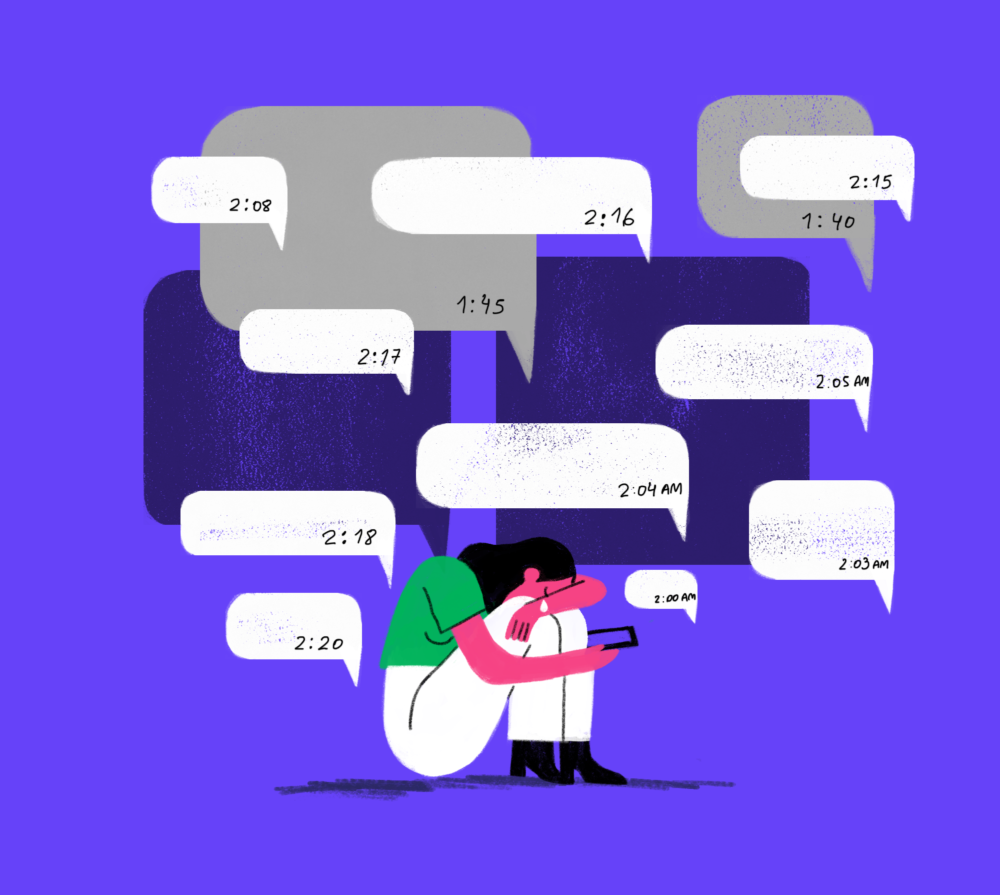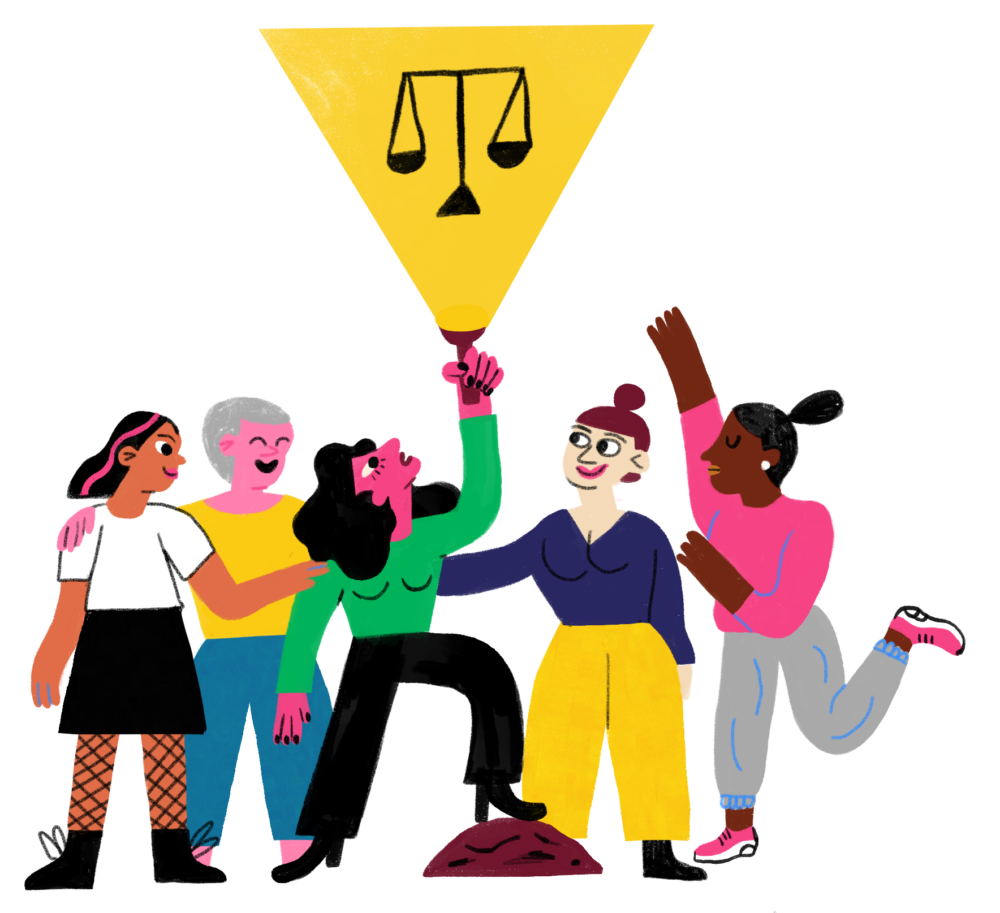
The Belén Whittingslow Case reflects the current situation of online gender violence and illustrates the lack of judicial independence and access to justice in Paraguay.
Belén denounced her teacher Cristian Kriskovich for sexual harassment and ended up applying for refugee status in Uruguay after being persecuted in Paraguay. It is relevant to state that Cristian Kriskovich, in addition to being a professor at the Catholic University of Asunción, is also a member of the Council of the Magistracy, the central body in the process of designation and appointment of judges and prosecutors 1, and of the Jury for the Prosecution of Magistrates, a judicial body with the competency to sanction magistrates and prosecutors.2
This case uncovers two fundamental issues in Paraguay: the pronounced discrimination, stigmatization and denial of justice affecting women who denounce sexual harassment, and the judicial obstacles that appear when seeking justice and reparation in cases where gender violence and sexual harassment take place in digital environments. Furthermore, the case illustrates the lack of judicial independence of the Paraguayan judicial system.

Background
The events denounced by Belén date back to 2013, when she was a student at the Catholic University and her then professor Mr. Kriskovich sexually harassed her through messages and images sent through the instant messaging application WhatsApp3. More than 1600 messages and images corroborate what happened.
Since the beginning of the investigation, a total absence of a gender perspective and a lack of knowledge regarding international standards on gender violence were observed on the part of the various intervening prosecutors, with some of them resorting to re-victimization practices against Belén4.
Despite a mobile phone expertise –main evidence of the sexual harassment denounced– having been ordered, after a brief was presented by Kriskovich’s defense the prosecutor in the case decided to call off the cellphone examination and dismiss the case5. This decision was ratified by the deputy prosecutor, who described the denounced acts, in a contra legem report, as “flirting or courtship”6.
Belén was re-victimized in many ways, as the sexual nature of Kriskovich’s messages was ignored, and her responses, which clearly indicated her nuisance and opposition to the harassment, were completely dismissed. This dismissal was the result of an analysis riddled with gender bias, founded on an idea of consent that did not exist, and which fully disregarded the position of power held by Kriskovich7.
Judicial violence

Right after the dismissal of the case on sexual harassment, Belén found herself involved in two legal proceedings against her, which continue to date: as a defendant in a criminal case on “production of non-authentic documents” at the Catholic University8 and as a respondent in a civil case where Mr. Kriskovich demands the payment of 450,000 USD as compensation for damages9. In both cases, Belén offered the cellphone expertise as proof of the alleged sexual harassment and its connection with the subsequent processes, but it was denied both times10.
Within the aforementioned criminal proceeding, a declaration of default and an arrest order were issued against Belén, and her defense was canceled without legal grounds, preventing her lawyers from accessing the computer system that allows access to the dossier11.
Following an audit request submitted by Belén’s family, a report from the Superintendency Council of the Supreme Court of Justice was released on September 13, 2019, which concludes that the process that led to declare Belén Whittingslow’s default and revoke her legal representation presented irregularities, and recommends an administrative proceeding against the judge who acted upon it12.
The decision to initiate an investigation corresponds to the Plenary Chamber of the Supreme Court of Justice. However, and despite having been presented with the report on at least two occasions 13, to date the Supreme Court has not pronounced, nor has it resolved a claim of unconstitutionality filed against the contested resolution14.
Faced with the fear caused by the arbitrariness of Paraguayan justice, the possibility of being arrested and her defenseless situation, Belén is now in Uruguay processing a refugee request15. Her intention is not to evade the procedures, but to have the necessary guarantees that she will be able to have an oral trial with full access to her legal defense and her rights.
Right to access to justice and judicial guarantees
In a democratic system, access to justice is a fundamental human right that aims to guarantee that all people are equal before the law. These rights are recognized by the Universal Declaration of Human Rights in its articles 7 and 8, which refer to the protection of the law and the right to an effective remedy, and by the American Convention on Human Rights in its articles 8 and 25, referring to the rights to a fair trial and to judicial protection. Paraguay has signed, approved and ratified both documents, which means that its application is mandatory, under Art. 137 of the National Constitution of Paraguay16.
On the subject we are discussing, we note with concern to what extent the violations of women’s rights taking place in digital spaces, in addition to not being fully recognized, result in a systematic denial of justice in the Judiciary. Legislation prior to Law 5777 of 2016, such as international human rights treaties, should apply in the same way to violence that occurs in digital spaces, adding up to pre-existing criminal types such as that of “sexual harassment”, recognized in article 133 of the Paraguayan Criminal Code17.
This omission of due process on the part of the State, as well as the omission of enforcing the law and providing fair defense mechanisms against human rights violations on the Internet, violence on the Internet, and other crimes committed in digital environments, contradicts the right to access to justice with a gender perspective.

International protection framework
Several international complaints have been filed regarding Belén’s case. The Inter-American Commission on Human Rights (IACHR) has become aware of the case since the Center for Justice and International Law (CEJIL), together with TEDIC and Belén’s family, sent on October 31, 2019 a “Letter Article 41” asking the IACHR to request information from Paraguay on the measures being adopted in the case. This letter has been processed by the IACHR, but we do not know which information was provided by the State in response to it.
Within the framework of this process, CEJIL and TEDIC have initiated dialogues with different authorities and we hope that they can help with the prompt resolution of the summary and the claim of unconstitutionality that is still unsettled.
Additionally, the victim’s family has lodged a complaint before various United Nations rapporteurs, without any specific intervention being achieved up to now.
Notas:
- Article 264 of the National Constitution of Paraguay
- Article 11 of Law No. 3759/2009.
- Case No. 8830/2014, entitled “Cristian Kriskovich on Sexual Harassment”.
- Brief provided by Belén, dated November 10, 2014, Case No. 2882/14.
- Resolution No. 9 of April 23, 2015, issued by the prosecutor Centurión, Case No. 8830/2014.
- Report No. 735 of June 1, 2015, issued by the deputy prosecutor Jorge Sosa, Case No. 8830/2014.
- Report No. 735, delivered by the deputy prosecutor Jorge Sosa, folios 4 and 5, Case No. 8830/2014.
- Case No. 2882/14, entitled “Víctor David Arce et al. on Production of Non-Authentic Documents”.
- Case No. 445/2016, entitled “Cristian Daniel Kriskovich de Vargas v. María Belén Whittingslow Castañé on compensation for damages for extra-contractual liability”.
- A.I. No. 239 of June 8, 2018, issued by the judge Vivian López of the First Instance Civil and Commercial Court of the 18th District of Asunción, Case No. 445/2016; A.I. No. 531 of December 19, 2018, issued by the Civil and Commercial Court of Appeals, Sixth Chamber, Case No. 445/2016.
- A.I. No. 625 of June 21, 2019, Case No. 2882/14.
- Annex VI – Audit Report dated September 13, 2019.
- Session of October 09, 2019, item 16; Session of October 16, 2019, item 11; Session of October 23, 2019, it was not even discussed.
- See https://www.abc.com.py/edicion-impresa/politica/2020/05/25/corte-congelo-accion-en-denuncia-contra-kriskovich-por-acoso-senalan/.
- See https://www.nanduti.com.py/2020/08/06/belen-whittingslow-habla-tras-ano-refugiada-uruguay/.
- Article 137 – Of the Supremacy of the Constitution: The supreme law of the Republic is the Constitution. [The Constitution], the international treaties, conventions and agreements approved and ratified, the laws issued by Congress and other juridical provisions of a lower hierarchy, sanctioned in consequence, make up the national positive law in the enounced order of preference. Whoever attempts to change that order, outside the procedures specified in this Constitution, would incur in the crimes that will be typified and punished in the law. This Constitution shall not lose its force nor shall it cease to be observed by acts of force or be abrogated by any means other than those which it stipulates. All provisions or acts of authority contrary to what is established in this Constitution are null and void.
- Article 133 – Sexual harassment: 1. Anyone who harasses another person for sexual purposes, abusing the authority or influence conferred by his position, will be punished with imprisonment of up to two years. 2. In these cases, the provisions of article 59 shall apply. 3. The criminal prosecution will depend on the request of the victim.


 Regarding the trends in the Antipyrawebs Observatory in 2023
Regarding the trends in the Antipyrawebs Observatory in 2023